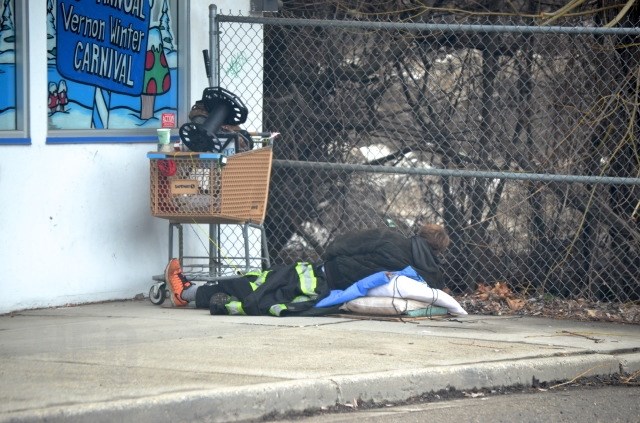
FILE PHOTO
(CHARLOTTE HELSTON / iNFOnews.ca)
March 26, 2023 - 2:30 PM
For those in Kamloops who knew Rick Greenstone it was tragic to hear earlier this month he had died while sleeping rough in the city.
“He would often stay out and camp and watch over other banned people,” Jennifer Adams, housing coordinator with the Kamloops Aboriginal Friendship Society, told iNFOnews.ca. “He was a guardian for vulnerable women on the street, they always talked highly of him. I’ve never had any negative interactions with him.”
A year earlier, another homeless man in Kamloops, known as Sam Mack, died in the cold.
READ MORE: Homeless Kamloops man found dead of suspected exposure at camp along river
Those kinds of individual stories haven't surfaced in Kelowna but this past winter at least four people sleeping rough in the city died.
Stephanie Gauthier, executive director of Journey Home Society, can’t say if they died from the elements because that’s up to the coroner to determine.
“To be honest, we may have lost more people,” she told iNFOnews.ca. “There are four people that we are soundly aware of.”
The mortality rate for those who are homeless goes much deeper than suffering in the cold, and doesn’t just happen in the winter.
“It’s unfortunate when it’s focused around winter because the reality is we lose lives on the streets all the time,” Gauthier said. “The mortality rate for people experiencing homelessness is a lot different than the general population.”
For men on the streets, the average age of death is 55, she said, and for women it’s 42. The average life expectancy in B.C. is about 79 years for men and 85 years for women.
People who live without shelter can die of all kinds of causes and not necessarily outdoors. They may even die in hospitals so are not considered to have died on the streets.
“If you or I get sick, we go to a doctor,” Gauthier said. “People on the street usually don’t have solid connections to health care or people are biased in accessing health care from the streets.”
Someone with diabetes, for example, even if it is diagnosed, may be struggling just to get enough food to survive, let alone trying to get the type of food they need to cope with their diabetes.
“We know food is medicine,” Gauthier said. “From a rounded picture of mortality for folks experiencing homelessness, it looks a lot different than people who are housed.”
To contact a reporter for this story, email Rob Munro or call 250-808-0143 or email the editor. You can also submit photos, videos or news tips to the newsroom and be entered to win a monthly prize draw.
We welcome your comments and opinions on our stories but play nice. We won't censor or delete comments unless they contain off-topic statements or links, unnecessary vulgarity, false facts, spam or obviously fake profiles. If you have any concerns about what you see in comments, email the editor in the link above.
News from © iNFOnews, 2023